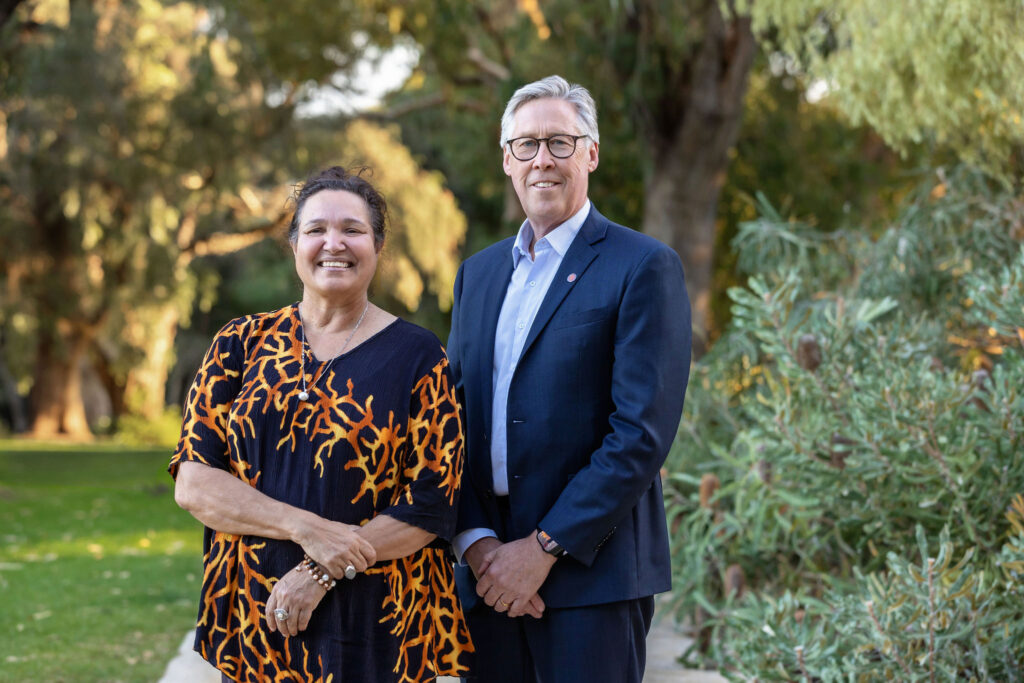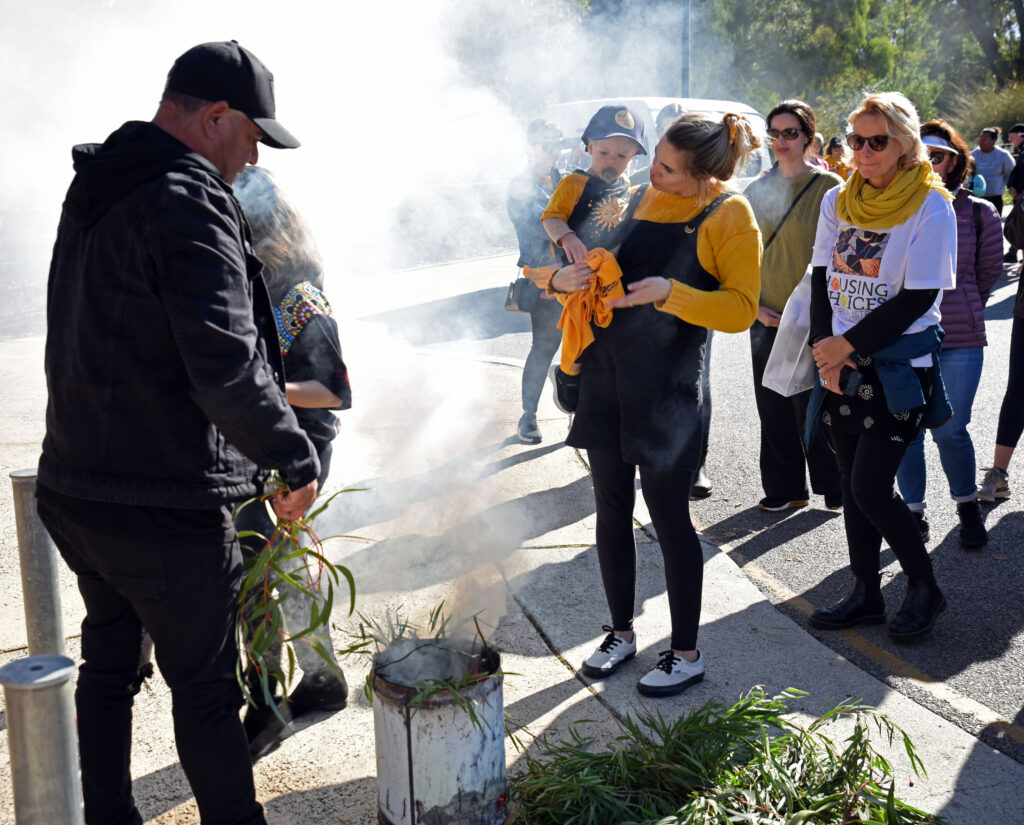Kaya,
On behalf of the Reconciliation WA Board, CEO and team, we encourage you to take the opportunity to have those final important conversations to make powerful change for the next generation.
Please join us at our Reconciliation Open House next week on Wednesday 18th (3.30pm-5pm) and Thursday 19th (8am-11.30am) if you need to share a cuppa and have a yarn with mob and likeminded folk.
In our final reflection before the referendum tomorrow, 14 October, our Non-Aboriginal Co-Chair, Gary Smith, provides a powerful opinion piece.
Boordawan,
Reconciliation WA
The Opportunity of a Socially Developed Country
Gary Smith, Reconciliation WA Non-Aboriginal Co-Chair
As the non-Aboriginal Co-Chair of Reconciliation WA, I have supported my Aboriginal Co-Chair and our Aboriginal Board members as they engage tirelessly and passionately across the national debate that is the Voice to Parliament.
As a relatively private person, this is a common approach for me but on this occasion, I am frustrated and perhaps even disappointed with my own lack of voice. We all need to be talking on this topic. I recently sat down to collect my thoughts about the Voice to Parliament, initially to allow me to engage more clearly about such a critical moment for Australia and First Australians.
As I wrote, I gathered the courage to write this as a more public expression, regardless of my natural inclination to hold these thoughts tightly to me. Is this a time for me as a non-Aboriginal person to sit back and merely applaud Aboriginal People and their generous offer generated from the Uluru Statement of the Heart? Is it about time for us wadjellas to do a bit of “heavy lifting” on this weighty topic, just as we should on the wider matters of reconciliation?
I certainly do not bring any authority to speak on behalf of Aboriginal People, but perhaps I could simply talk to the rest of us. The 97% of people across our wonderful country who are not Aboriginal People.
So, to all Aboriginal and Torres Strait Islander peoples reading these thoughts of mine, I would like to acknowledge your strength and resilience as you move through this referendum process whereby the whole of the country is discussing you, either berating you or supporting you, misinterpreting you, celebrating you, dismissing you, or aligning with you.
Please allow me to now talk to my fellow non-Aboriginal Australian citizens and know that you have my respect as an ally.
All through time, the human race has generally had to fight to advance. To maintain a border, an economy, a religion, a privilege, a safety – a preservation of something that is dear to us. These things were usually “life or death” and over eons, we have learnt to practise our self-preservation skills.
Sometimes our societal advancement has felt sharp and painful, when we experience wars, disasters, revolutionary movements, whilst other times it is more gentle and even evocative, perhaps based on the influence of television, internet and social media.
In all matters, we usually have a choice. When confronting change, we can resort to a state of fear that creates a desire to attack and repel, or we can consider this as an opportunity for an advancement of our society. This opportunity often asks us to question powerful beliefs, often engrained by our parents, our religions, our workplaces or our cultures.
In a socially developed state, there is more compassion for those without a voice; more willingness to lend a hand up to all elements of our society, to recognise that everyone has an opportunity to contribute, to acknowledge that the dominant holders of societies rules do not always know what is best, to strive for a blending of many societies in order to have a
richer experience of life itself, to understand more deeply and to strive more firmly for a development of our cultural norms that include all citizens, to ensure no-one is left behind.
Our latest opportunity to consider the Voice to Parliament is such a societal challenge. Through the referendum process, the people of Australia have an opportunity to proudly improve our recognition and support for Aboriginal Peoples of this country.
We are at a time when the most oppressed peoples in our country are asking for their opportunity to speak. Not to rule. Not to legislate. Not to dominate. Not to gain any rights beyond the normal citizen. Just an acknowledgment that, as the First Australians, and as a very small minority that have been historically oppressed under colonised rule, they could be afforded the opportunity to advise the Government on how their views could be better considered as our country continues to develop and provide a home for its peoples.
Do they want us to do much heavy lifting? No. With the Voice, First Australians want a right to prove their ability to create a more powerful future for themselves by being more successfully heard – this is a request for the right of self-determination – that wonderful capacity that empowers people to think and act for themselves and engenders a passion to
ensure that action is sensible, powerful and impactful for their people.
This intention alone gives more hope of a “Closing of Gap” advancement than any colonised strategy that has been applied without consultation by governments over the last 100 years.
This discussion was never going to happen 250 years ago under a colonising advance with “Terra Nullius” as a dominating rationale, but it could happen today. Our children and our grandchildren will be the powerful beneficiary of today’s decision – we are the people that have this unique opportunity in front of us and we must not squander it for future
generations.
We now understand the terrible history of treatment of First Australians. We can now do our bit to set right a pathway that allows First Nations people to stand taller and more firmly as acknowledged “first peoples” of a country that itself should be striving to learn more about its indigenous culture and history – something that is uniquely ours in parts, regardless of our varying ancestries.
A socially-developed state recognises that a vote for Yes is a bigger decision than a reflection on “a worrying legal risk”. It is more than “another piece of bureaucracy”. It is particularly not a vehicle requested by or for Government. It is not a third chamber of Government.
It is a simple request from First Australians to recognise them in the Constitution – something that has been achieved by most countries around the world with a colonised “history”. It is a request to allocate a right under the Constitution to maintain a permanent discussion with Government in a way that materially improves the lives of Aboriginal People.
It is our time to be more socially developed as a country and to act with more than the base instinct of a human being to “defend its patch”. It is time to now build our Nation with a small act that promotes an opportunity for a hitherto-ignored minority group of people to express their preferred pathway to equality in this country.
First Australians are being humble and careful in stating their request of us. They ask simply for a permanent opportunity to provide advice to the Government on matters affecting them. I think Australia can demonstrate ourselves to be a socially-developed country in supporting
this courteous request.
Gary Smith.
Reconciliation WA Non-Aboriginal Co-Chair


